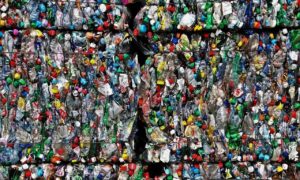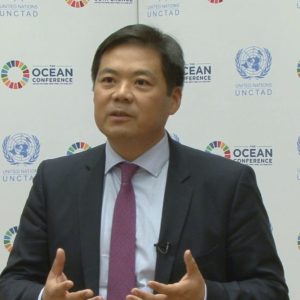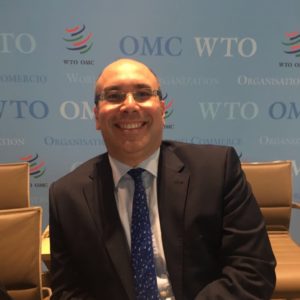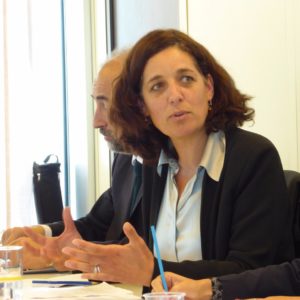Event Virtual
Geneva Beat Plastic Pollution Dialogues | Plastics and Trade

The Geneva Beat Plastic Pollution Dialogues aim to facilitate further engagement and discussion among the stakeholders in International Geneva and beyond. In addition, they intend to address the plastic crisis and support coordinated approaches that can lead to more efficient decision making.
About the Dialogues
The world is facing a plastic crisis, the status quo is not an option. Plastic pollution is a serious issue of global concern which requires an urgent and international response involving all relevant actors at different levels. Many initiatives, projects and governance responses and options have been developed to tackle this major environmental problem, but we are still unable to cope with the amount of plastic we generate. In addition, there is a lack of coordination which can better lead to a more effective and efficient response.
Various actors in Geneva are engaged in rethinking the way we manufacture, use, trade and manage plastics. The Geneva Beat Plastic Pollution Dialogues aim at outreaching and creating synergies among these actors, highlighting efforts made by intergovernmental organizations, governments, businesses, the scientific community, civil society and individuals in the hope of informing and creating synergies and coordinated actions. The dialogues will also look at what the different stakeholders have achieved at all levels, present the latest research and governance options.
In addition, although the dialogues target stakeholders from all continents, they primarily aim to encourage increased engagement of the Geneva community in the run-up to various global environmental negotiations, such as:
- UNEA-5 (1st and 2nd sessions) in February 2021 and February 2022
- BRS COPs in July 2021
- SAICM ICCM5 in 2022
This first session of dialogues will end in February 2021 to build momentum towards the first session of UNEA-5. It will aim to facilitate further engagement and discussions among the stakeholders in International Geneva and other actors across the regions, supporting coordinated approaches that can lead to more efficient global decision making. It will also intend to provide a platform to further carry the discussion from the recently concluded Ad Hoc Open-Ended Expert Group (AHEG) on Marine Litter and Microplastics towards UNEA-5 part 2 in 2022.
The Plastics and Trade session is the sixth dialogue to be organized leading to and making recommendations towards the High-Level Dialogue on Plastic Governance Dialogue on 11 March 2021.
The dialogues are organized in collaboration with the Basel, Rotterdam and Stockholm Conventions Secretariat, the Center for International Environmental Law, the Global Governance Centre at the Graduate Institute, Norway, and Switzerland.
Plastics and Trade Session
Trade plays a central role in the global plastics economy. Across the life cycle of plastics, international trade is a vehicle for the spread of plastics and plastic waste across borders. Recently, UNCTAD estimates that trade in plastics accounts for at least 5% of the total value of global trade. For some categories of plastics, over 60% of global production is traded internationally. As a growing number of countries join the call for a new international treaty on plastic pollution, there is also growing interest in the relevance of international trade and how greater cooperation on trade dimensions could support international environmental cooperation.
In the past few years, public alarm about the export of plastic waste to developing countries without adequate infrastructure for proper treatment and disposal – and the realization that only a fraction of the waste exported is recycled – has spurred many governments to take action. In 2018, China introduced a ban on certain plastic waste imports, a move followed by several other countries. In May 2019, the 187 parties to the Basel Convention added most types of plastic waste to the list of controlled wastes, effective on 1st January 2021. Many countries will require support for the implementation of the new Basel Convention’s new trade-related provisions on plastic waste, and there are important discussions underway on how to do this in a way that also facilitates effective recycling markets and circular economy efforts.
Meanwhile, there is growing attention to the challenges associated with trade in plastic products, not just waste, and especially single use plastics, which add to the plastic pollution burden that countries must manage. A growing number of countries have introduced bans on particular single-use plastic products for this reason, including a number of bans on the import of such products. Meanwhile, with the arrival of the COVID-19 pandemic, demand for single-use plastics for personal protective equipment has increased. In order to promote sanitation and slow the spread of virus, various governments, have rolled back or postponed bans on single use-plastics. At the World Trade Organization (WTO), governments are showing increased interest in how international cooperation on trade dimensions can support efforts to tackle plastics pollution. Trade-related aspects of plastic pollution have been raised as an issue in every meeting of the WTO Committee on Trade and Environment (CTE) since November 2016. There have also been various workshops and informal consultations both within and outside the WTO to raise awareness and support for action on this topic in the past years.
In November 2020, an open-ended informal dialogue was launched among interested WTO members at the WTO trade and environment week, cosponsored by a diverse group of developing and developed country cosponsors. This informal dialogue aims to complement existing international processes and explore how improved trade cooperation could complement domestic, regional, and global efforts to reduce plastics pollution and transition to a more circular and environmentally sustainable global plastics economy.
At UNCTAD, plastic pollution and waste management have been identified as challenges to be addressed when promoting sustainable manufacturing, circular economy, and sustainable blue economy approaches. Research and policy dialogue on plastic pollution and waste have been developed within the context of UNCTAD’s work streams on oceans economy, circular economy, financing a global green deal, and statistics. UNCTAD is also supporting research on the opportunities for developing countries in the production and export of non-plastic substitutes, such as those made from natural fibres.
Meanwhile, at the bilateral and regional level, there are important opportunities to support regional approaches to the intersection of international trade and plastic pollution policies, and a need to ensure that ongoing trade negotiations support and do not undermine national efforts to combat plastic pollution.
Leading experts invited to talk at this session looked at the potential contributions of trade policy to international cooperation on reducing plastic pollution.
Other Sessions
- Plastics and Waste | 26 November 2020
- Plastics and Climate and Air Pollution | 10 December 2020
- Plastics and Human Rights | 14 January 2021
- Plastics and Health | 21 January 2021
- Plastics and Standards | 28 January 2021
- Plastics in the Life Cycle/SCP | 11 February 2021
- High-Level Dialogue on Plastic Governance | 11 March 2021
Speakers

H.E. Amb. Chad BLACKMAN
Permanent Representative of Barbados to the United Nations Office and other international organizations in Geneva, Chair of WTO Committee on Trade and Environment

Jean-Marie PAUGAM
Permanent Representative to the World Trade Organization, France

Aik Hoe LIM
Director, Trade and Environment, World Trade Organization

Amélie TAOUFIQ
Legal Officer, Basel, Rotterdam and Stockholm Conventions Secretariat

David VIVAS
Legal Officer, Office of the Director, Division on International Trade and Commodities, UNCTAD

Alice TIPPING
Lead, Fisheries Subsidies, International Institute for Sustainable Development

Carolyn DEERE BIRKBECK
Senior Researcher, Global Governance Centre, Graduate Institute

Steven STONE (moderator)
Chief, Resources and Markets Branch, UN Environment Programme
The participation of the Global Governance Centre in this collaborative series was made possible through support from the Swiss Network of International Studies (SNIS).
Summary
Welcome and Introduction
Introduction to the Session | Steven STONE, UNEP
Plastic pollution is one of the major issues of our times. Every year, over 300 million tons of plastic waste are generated. The extent and urgency of the problem is even clearer when we know that half of all plastic ever produced was produced since the 2000s. As we try to halt plastic pollution, addressing the interface between trade and plastics is important, as trade is a central part of our economies. One third of our global GDP is traded. As trade contracted by 9-10% last year due to the pandemic, we have to wonder how resilient are our value chains, what is the role of localization and sufficiency, and how can trade contribute to the goals we have, including controlling our plastic waste.
Many governments have taken actions to combat plastic pollution, such as restricting plastic waste imports or banning various single-use plastic products. For those who care about trade and its role in building resilience and prosperity, it is time to look at the plastic crisis and consider the upsides of trade governance around plastics and how can trade be a boon for our efforts to manage plastics.
Setting the Scene
Trade Central Role in the Global Plastics Economy | Carolyn DEERE BIRKBECK, Global Governance Centre
Trade and plastic pollution are interlinked, as the plastic economy is global, and international trade flows are central to the production, consumption and disposal of plastic products. Business-as-usual projections estimate that plastic production will quadruple by 2050. Therefore, we can expect a significant expansion of international plastic trade as well.
My colleagues and I have recently published a study on the volume and value of international trade of plastics, showing its significance across the plastics life cycle and global supply chain. Our study showed that the total value of plastics trade in 2018 was more than 1 trillion $USD, representing around 5% of global trade. We need to differentiate trade flows across the life cycle of plastics, including trade in fossil fuel feedstock, additives, virgin primary plastics such as pallets and fibers, intermediate forms of plastics, manufactured products, and waste. Most estimates of plastics trade focus only on a subset, and our study showed that there is a least 40% more by value and 50% by volume than what is usually accounted for. To help provide a more accurate picture of these numbers, UNCTAD has developed a prototype database which will be available to the public in the upcoming months.
Importantly, our study highlights that the trade challenges in relation to plastic pollution are not only linked with imports of plastic waste, but also of plastic products which then become waste. The challenge comes from the huge diversity of plastic products, including packaging and plastic embed in other products, that become part of the waste stream that countries are faced to manage, often unsuccessfully, resulting in leakages to the environment.
With the way that trade is currently classified and measured, it is very difficult to get a handle of all plastics across international borders. For example, our study does not capture the huge amounts of pre-packaging products, packaging used for transportation and international distribution, or the million tons of plastics embedded in other products. However, what our study does show is that trade flows are central to the global plastic economy, and that we need to understand them better in order to find out the best ways to intervene. It also highlights that it will be insufficient to address plastic pollution at the national level only.
Trade policy is highly relevant in this context, as it is the main instrument that government use to manage what goes in and out of their countries and on what terms. Many countries are already taking actions, such as restricting imports or exports of plastic waste, banning single-use plastics, or using ecolabels to impact plastics trade. However, the globalized nature of plastics production and distribution means that there’s limit to what countries can accomplish on their own.
Current trade-related efforts are disjointed and uncoordinated. Industries of exporters have difficulties adjusting to increasingly complex regulatory frameworks in different places of the world. Market leading companies that are trying to reduce their plastic footprint need trade policy frameworks that encourage others to do the same. Thus, there is currently a large gap in cooperation on these trade-related aspects. Today, the Basel Convention is the only international convention that explicitly address plastic in trade, specifically plastic waste.
Looking forward, we need to think how trade policies can create the right incentive for more sustainable plastic production and the greater use of substitutes. This means we need to think how to strengthen trade-related cooperation, and how to ensure that cooperation on trade dimensions is part of the global governance efforts to address plastic pollution, including in the proposal of a new treaty on plastics.
To conclude, let me offer you a set of concrete suggestions on the kinds of trade-related options that governments can work on collectively:
- Restrict the export of plastic products that are already restricted or banned domestically
- Work at the regional level on common approaches to trade-related measures
- Look for ways to promote trade in environmentally sustainable waste management technologies and non-plastic substitutes
- Identify where international standards on plastics are needed to promote sustainable plastics trade and how transparency can be boosted
- Explore how aid for trade can support the implementation of the Basel Amendments
- Provide incentives that support international markets for recycling, while cracking down on illegal and unsustainable trade of plastic waste
- Reduce environmentally harmful subsidies
- Adopt targets, for example to reduce plastic packaging in trade
WTO CTE Informal Dialogue to Promote Sustainable Plastics Economy | H.E. Amb. Chad BLACKMAN, Barbados
Last year, a group of 12 WTO members launched the WTO informal dialogue on plastic pollution and environmentally sustainable plastics trade. The informal dialogue serves as a groundbreaking effort to find ways to improve trade cooperation, reduce plastic pollution and build a global plastic economy circular, safe and inclusive. This dialogue seeks to complement, and not duplicate, actions to reduce plastic pollution conducted by cities, local communities, academic institutions, businesses, and intergovernmental forums. The dialogue is open to all members, so I am sure many more will join given the importance of the issue.
The growing focus on plastic at WTO cannot arrive soon enough. The world is confronting the most acute health crisis in a century, as well as an economic crisis and the triple planetary crisis of climate change, biodiversity loss and pollution. Plastics pollution is intimated connected to all these crises.
In their joint communication to the WTO Committee on Trade and the Environment (CTE), members of the informal dialogue recognize the rising environmental health and economic cost of plastic pollution and how the pandemic has amplified these costs. They highlight that plastic pollution is a concern for all countries and regions. Plastic pollution does not care for borders: its global nature demands globally coordinated response.
WTO should work side-by-side with the environmental policy community and all other stakeholders. This interface is incredibly important. Last week, in an address to the Ministers of the environment of Latin American and the Caribbean, I reminded them of our joint responsibility to work in concert, to craft trade and environmental policies that reinforce each other, and to be active players in global efforts to seize opportunities that are good for the planet and for trade. The informal dialogue is an opportunity to do just that, and to demonstrate that trade officials are not oblivious to the concerns of people. It is also the opportunity to show how trade policy can be part of the solutions to environmental problem.
The informal builds on good foundations. First, plastic pollution has been raised as an issue in every WTO CTE meeting since November 2016. There have also been useful workshops and informal consultation both within and outside the WTO. Several members have shared their experience and trade measures options to address plastic pollution. Secondly, the WTO environmental database shows the broad range of trade measures used in connection to plastics. This provides members of the informal dialogues with a factual basis to consider the scope of a globally coordination action. Finally, another group of WTO members has recently embarked in structured discussions on trade and environmental sustainability. There are tremendous synergies between this work and that of the informal dialogue on plastic pollution, suggesting that all members involved in these initiatives should coordinate their efforts.
The pollution trends should be reversed. The challenge is not to get back on track, but to shift tracks to an economy that works for the planet and people. I am glad to see the positive momentum in the trade and environment discussion within the WTO. The informal dialogue is a clear sign that the willingness to act is present. At the national level, Barbados declared a ban single use plastics. We can only encourage other countries to do so. However, if only a few countries take such steps, the impact may not be significant.
We also need to consider how we get the private sector to shift from its current heavy use of plastics to more sustainable patterns. In that sense, the scientific community have to engage strategically with businesses to foster innovative solutions. Financial players will also have to fill the finance gaps for small and medium enterprises to ensure that they can meet the new demands and participate in international trade.
Now is a ground zero moment and I encourage members to find concrete and practical ways to seize the huge potential of trade policies, to help us build back better and to propel us forward to a green, clean and inclusive future. Barbados is fully committed to these initiatives. In my national capacity, you can count on the steadfast support that we have brought to the process and we encourage others to do so as well.
International Governance on Plastics and Trade
WTO and the CTE
Role WTO and WTO CTE Can Play in Providing a Forum for Debate on Current Trade and Environment Issues | Jean-Marie PAUGAM, France
Unfortunately, we must recognize that, up to now, the WTO has not been delivering much on its sustainable development agenda. WTO members have been by and large ignoring the environment in terms of delivery. It is now time to explore how we can do better, by answering the basis questions of why, when, what, and how.
Why should WTO take action on plastics? All work of WTO is based on its mandate, and sustainable development is part of the statutory objectives of the WTO according to the Marrakesh agreement which created the organization. Ironically, the words “free trade” do not exist in the rule book of the WTO, while “sustainable development” does. Therefore, environmental negotiations are mandated by the sustainable development objectives, adopted by the head of States. Another reason is that there is a strong demand for WTO to act on sustainable trade. This demand is strong both within the private sector through corporate social responsibility initiatives, and at the multi- and bilateral level . Moreover, COVID has been an accelerator of the awareness of the links between us and our environment, and how trade can be both part of sustainability problems and solutions.
When should this action be taken? In the short-term, there are the fisheries negotiations, which has failed twice in 2017 and 2020, and thus need to be successful this year. But more importantly, there are several plurilateral initiatives within the WTO CTE: one on plastics, and one on the Friends of Advanced Sustainable Trade (FAST). These initiatives are groundbreaking because they are promising news regarding how WTO can catch up on the major transition toward green economy.
What can WTO deliver? On a broad level, WTO should concentrate on where its added value lies, in order to contribute to the whole system without duplicating other efforts. This added value is found, first, in every case where there is a critical mass needed to avoid the free riding problem. Fisheries is a typical example of such case, because reforms at the regional or national level will fail to fully address the problem as fishes do not know borders. Similarly, the plastic economy is global by essence, and thus it fits very well into WTO’s work. Secondly, WTO should focus on what is does best: transparency (monitoring flows and exchanging best practices), binding, and liberalizing in some contexts.
How should WTO move forward? A simple answer is pragmatism. WTO should use the CTE as an incubator and catalyst for developing the WTO role. The WTO Environmental Week is a very interesting setting, because it creates a space for dialogues between trade negotiators, civil society and businesses. Additionally, WTO should work on concrete issues, as attempts to engage in systemic and holistic discussions, for instance on the links between trade and multilateral environmental agreements, have failed. Plastics is a good candidate – among others such as fossil fuel subsidies reform, climate change, and circular economy – to make progress on concrete action. Another principle that we should keep in mind is to work on issues that are of interest to developed and developing countries. Plastic pollution is very interesting in that regard, as the informal dialogue is a South-North coalition.
Finally, WTO is dominated by the legacy from the General Agreement on Tariffs and Trade (GATT), which is focused on exchange and hard law. However, to address environmental issues, we need a change of mindset toward cooperation to create a public good. WTO has to start thinking about a vast array of norms, which may involve soft law and opt-ins, in order for members to build a public good. For example, as Barbados, the EU and other countries have imposed bans on single-use plastics, we could think of similarly banning the exports.
We are in a ground zero moment, and it is time to change our approach. Plastic pollution is a critical issue that ticks all the boxes. It is a concrete problem, with a clear and present danger that impacts both developing and developed countries. It also requires some change to find a critical mass to complement regional initiatives, while having room for different national initiatives. Therefore, plastic pollution is an issue on which WTO can definitely contribute.
Trade Supporting Efforts to Tackle Plastics Pollution, Next Steps at WTO | Hoe LIM, WTO
To start off with a basic conceptual governance point, the system revolves around WTO members. WTO membership is almost the same as the one of the Basel and Stockholm Convention and UN agencies, such as the UN Environment Programme. Gaps in the area of plastics and trade need to be bridged and there are currently many discussions within the WTO. Yet, it is important that discussions also take place within governments, for instance that trade representatives and environment representatives collaborate in order to progress in the different international fora that they take part in. One of the reasons why WTO has the Committee of Trade and the Environment (CTE) is to facilitate that process of governments speaking with each other, but also internally. The conversation is often difficult, and this coherence challenge has to be addressed.
On the other side, it is very positive that some members have taking on the challenge. In that regard, the informal dialogue has great potential to further the dialogue on coherence, ensure that the actions of governments represent themselves in various fora and to ensure that we get the results that everybody desires.
The informal dialogue focuses on six areas: improving transparency, monitoring trade trends, promoting best practices, strengthening policy coherence, identifying the scope for collective approaches, assessing capacity and technical assistance needs, and cooperating with other international processes and efforts. The emphasis is on identifying opportunities for enhanced trade cooperation within the rules and mechanisms of WTO, and on supporting efforts in other fora. This dialogue is not starting completely without a precedent. There have already been discussions within the CTE on plastics, and members themselves have deployed initiatives at the national, regional and international level.
To precise what we mean by trade supporting efforts and the types of measures that it could comprise, a look at the WTO database is useful. This database scans all notifications to the WTO, and it has been noted that measures to combat plastic pollution notified to WTO have been increasing. While there are possibly many more existing measures that have not been notified to WTO, this database already provides an overview of the landscape on plastics and trade policy. Measures notified to WTO include mostly technical regulations for better waste management, but also importing licensing schemes to regulate trade flows of certain plastics, taxes, charges, and bans on single-use plastics or plastic bags.
The informal dialogue could shed more light on trade flows in plastics, on which information is scare because of their complexity, and problems of classifications. It could also advance work on circular and sustainable economy, in particular to understand the regulatory obstacles in reverse supply chains. International standards could also form an important area of work for the dialogue. Discussions on capacity gaps, including aid for trade, enhanced integrated frameworks, and quality infrastructure for developing countries to meet standards, constitute some additional areas of work.
Finally, we should investigate uniquely trade type opportunities. This means removing trade obstacles to disseminating technologies for plastic substitutes and/or biodegradable plastics, to scaling up investments in waste management infrastructure, to increasing resources efficiency through circular economy, and ways to promote plastic alternatives. Concretely, this area looks at whether there are tariffs, non-tariffs barriers or perverse subsidies that need to be reduced or removed. All of these elements should be part of the conservation on plastics and trade.
Plastics and Trade in Other International Fora
Basel Convention Regulating Plastic Waste Trade| Amélie TAOUFIQ, BRS MEAs
Looking at the crossroad of environmental and trade issues, there has been a recent positive shift in discussions and attitudes thanks to the Sustainable Development Goals (SDGs) and the 2030 Agenda. The problem of plastics has also broad much attention to the interface of environmental problems and trade. In that area, multilateral environmental agreements (MEAs) and WTO regimes are mutually supportive. This complementarity with trade is mentioned in the preamble of the Rotterdam and Stockholm Conventions. Thus, it is encouraging to see these interlinkages being now widely recognized.
Despite this progress, strong silos remain in some areas. One of these challenges is that member States representatives sitting at different fora may or may not be the same. While some countries have enough resources to have both a UN mission and a WTO mission in Geneva, it is not the case for all. This gap is present in the different international fora, and at the multilateral, regional and national level. Even if silos are being reduced thanks to debates on sustainability, ministries often do not communicate enough with other each, creating many gaps in action at various levels.
The Basel Convention reached a big milestone on 1 January 2021 when the Plastic Amendments became effective. Like WTO, the Convention is driven by its Parties, who decide, deliver on and adapt the mandate. In 2019, Parties have agreed on the Plastic Amendments and on the establishment of the largest partnership in the history of the Basel Convention: the Plastic Waste Partnership (PWP). Launched in March 2020, this partnership brings together governments, intergovernmental organizations, academia and civil society actors. This is the opportunity to foster international cooperation, avoid silos, and engage more with the private sector. The partnership creates a space for solutions to be developed through calls for pilot projects, with a focus on initiatives to help developing countries implement and enforce the Basel Convention.
Another aspect we should focus on relates to implementation, as legally binding agreements often face issues in that area. The concept of soft law, which we discussed earlier, is particularly interesting in that regard, as many countries as not always comfortable with legally binding measures. These steps are just the beginning of the journey. The Basel, Stockholm and Rotterdam Conventions Secretariat is looking forward to the next Conference of Parties, which will take place in 2022.
The Blue Economy and the Plastic Pollution and Waste Management Challenges | David VIVAS, UNCTAD
This presentation was based on the new published report by Diana Barrowclough and David Vivas on Plastic Production and Trade in Small States and SIDS.
Significantly reducing marine pollution is part the global agenda for all of us, as it is indicated in the Sustainable Development Goals (SDG 14.1). Downstream plastic pollution is a consequent problem, with about 8 million tons of plastic ending up in the oceans every year. While this represents a mere 3% of plastic produced, it created already six vast garbage patches on our oceans. These patches are only the visible part of the problem, as plastics tend to float for around two years before sinking at the bottom of the oceans, where enormous amounts of plastics are accumulated. If current trends continue, out oceans could contain more plastic than fish by 2050.
Biodegradable plastics are not a solution, as they may still dissolve into microplastics. These tiny particles enter the food chain as they are ingested by fishes, engendering adverse effects on human health. Plastic pollution negatively affects many sectors that are important for small island developing states (SIDS), such as fisheries, aquaculture, tourism and transport.
Trade is an important aspect to consider when addressing plastic pollution. The latest data estimates that 336 million metric tons of plastics are traded globally, for a value of more than one trillion $USD. Most of the plastic pollutants in the oceans are consumer goods, such as final manufactured products, plastic textiles and packaging. Synthetic materials used in clothes and fishing nets are particularly worrisome due to the dramatic impacts on marine life.
Plastic exports from SIDS represents only around 15 billion $USD, less than 1% of all exports worldwide. Therefore, we observed here a similar problem as with climate change: while these countries do not contribute much to the problem, they are disproportionately facing the consequences.
SIDS have responding to the problem with trade policy and regulations, as our analysis revealed. Most of these actions are linked to single use plastics, whether in the forms of bans, regulations or taxes. The level of notification to WTO is less than 20%, suggesting that the analysis of WTO database only reveals the tip of the iceberg. Thus, we need to increase the level of notification to WTO to have a better picture of the regulatory landscape on plastics. As many countries are concerned about plastic pollution, regulatory mapping is needed to understand regulatory distance, prevalence, scope, and content, and to inform any future reform within WTO and/or the UN.
Reducing plastic pollution will require to develop trade and waste management responses, for instance:
- Enable reduction of plastic use & increase use of environmentally preferable plastic substitutes, such as natural fibers, agricultural waste and other types of material
- Reduce tariffs and address non-tariff measures for plastics substitutes and alternatives at WTO
- Undertake a detailed mapping of non-tariff measures beyond WTO database
- Promote environmental services liberations and minimum regulatory harmonization, including for solid waste management within WTO
- Increase understanding on how to deal with different types of wastes and associated risks
- Increase communication and coordination of national and municipal authorities
- Regulate the recycling and second use waste sectors
We need to make use of opportunities to introduce a sustainable join trade and development plastics initiative into the multilateral trade system. There are many tools that could help getting closer to that goal such as developing platforms and promoting soft law. The Conference in October, potentially three months before the WTO Ministerial will be the opportunity to further multilateral action to achieve the Sustainable Development Goals (SDGs).
The Role of Subsidies in the Global Plastics Economy | Alice TIPPING, IISD
While other speakers have highlighted the role of trade policy to address plastic pollution, I will address more specifically how trade policy tools can be a useful way to tackle the problematic subsides to plastics.
One of the main underlying problem fueling the oversupply of plastics in the global economy is that primary plastics are extremely cheap. Therefore, substitutes for plastics and recycling are less competitive. Plastics are produced from fossil fuel, a sector which is heavily subsidized in many places. Both fossil fuel production and plastic feedstock production are concentrated in a small number of countries. Additionally, 60% of primary plastics are traded internationally. Thinking of all these elements together, we know that subsidization of primary plastics is likely to impact plastic production and use around the world. Therefore, subsidies are an important element, in particular to fossil fuels at the beginning of the value chain.
While these known facts give us an idea of the scope of the problem, there are still many areas where we need more information. We do not know exactly how much subsidies to fossil fuels impacts the production of plastics. However, given the scale of these subsidies, we can assume that they probably have considerable impacts further along the value chain. We also do not know what subsidies are provided for petrochemicals, and the production of plastic inputs and final products. We know a bit, but not yet enough, about the production and market dynamics of subsidization for different kinds of plastic products.
In light of these gaps, the next important step is to learn. We need to get data on the types and scale of subsidies, who provides them, and what their trade and environmental impacts could be. We also need to learn from previous attempts to reform subsidies, for instance national reforms of fossil fuel subsidies and multilateral negotiations on the reform of fisheries subsidies. Once we understand better what the subsidy problem is and how it affects the global plastic economy, we can start identifying different policy solutions
These solutions have to be designed accordance with the data. If the problem lies with subsidized production of fossil fuels or plastic feedstock by a few very large players, the solution may well be an agreement among those actors to reduce subsidies. If the problem is not only subsidies of fossil fuels, but also of production along the value chain, maybe we need a multilateral discussion about these subsidies, the impact they have and what countries ready to do to scale down their subsidization.
Finally, trade policy solutions are only one part of what governments do to address the plastic pollution challenge. There is a broad range of actors tackling this challenge, and trade policy may only play a part in these efforts. However, the plastic economy is so global that trade policy is needed to support the domestic measures that countries are willing to take to address plastic pollution within their borders.
Q&A
Question: Are there any analogies between the fisheries subsidies discussion, currently taking place within the WTO CTE, and the plastics discussion?
H.E. Amb. Chad Blackman: These discussions have in common that the issue of sustainability is at the center. When we look at issues of trade and environment, it’s essential to think how we are going to build a global economy that allows for growth but does not harm the environment. And this is particularly important as we build go forward after the pandemic. There is a consensus among WTO members and stakeholders that growth must take place, but it must be done in a way that is sustainable on the long-term and does not degrade the environment. The challenge is to find this delicate balance.
Jean-Marie Paugam: We need to use the CTE, as it is a unique locus within the WTO as it is neither a negotiating body nor an agreement managing body. Therefore, it is the only place where members can freely discuss without risking to have their hands tied. The plastic issue is relatively new and thus needs to be explored in that arena. We need to explore how trade can contribute to the SDGs, even if trade may not be the main response to all these challenges. Trade actors often like to discuss environment when it can be combined with liberalization in some win-win scenarios. We need to go further to explore how we can integrate the environment within the business of trade. These discussions should happen at the CTE level or through plurilateral dialogues.
Hoe Lim: We also need to hear more from the private sector. Action from businesses is needed if we are to shift growth. Therefore, they need to be brought into the conversation.
Question: What significance could a global agreement on plastics have for WTO?
Hoe Lim: This mainly depends how the discussions around a global agreement are structured and what the outcome is. If the process ends with a new multilateral agreement (MEA), WTO would have to look at issues of coherence. This would be similar to the current collaboration of WTO with the Basel, Rotterdam and Stockholm Conventions, which is working quite well. At the governmental level, coherence would have to be brought about through the delegates participating the both fora. On the legal side, WTO has not yet faced any dispute regarding an MEA, but of course this is a possibility. So far, jurisprudence has shown that governments can take whatever measures they need to safeguard the environmental objectives they have set for themselves.
Question: What is the role of the private sector in solving the plastic challenge?
David Vivas: As innovation will play a significant role in whatever materials will be used for the future, businesses will be key actors. Consumers are also important actors, as they can force the private sector to change, and we are already observing changes in public awareness around plastics. Innovation can help to create change, whether in amount of plastics used, in the types of materials, including non-plastic substitutes, in business models, etc. While innovations may be protected through intellectual property, there are many low-cost and easily accessible technologies that can help address plastic pollution.
Q: How to various efforts to address plastic pollution within international governance come together and move in the same direction?
Amélie Taoufiq: At the governance level, negotiation can take time to achieve a consensus. Therefore, I would advocate for improving the existing tools. Without any disregard for the new proposals for a global agreement, I would like to point out that there are alternatives to legally binding instrument in order to concretely move things forward at the pace of the business world.
Q: Any concluding thoughts?
Carolyn Deere Birkbeck: One key message today is the importance of coherence between the different policy making fora, and this starts at home with ministries engaging with one other and at the different governance fora. A second aspect is that we have enormous capacity constraints at the national level to implement environment policies. We need to pour a lot of political energy into that dimension. A third point is that, for the economy to be transformed, we need environmental policy to set the bar high and economic policy to get us there. Because the plastic value chain is truly global, many countries have an interest in the issue, and it will be complex to work out. Therefore, we should be cheering the fact that there are countries interested in helping to tackle this problem
Closing
Video
In addition to the live WebEx and Facebook transmissions, the video is available on this webpage.
Documents

Links
The update on Plastics and the Environment provides relevant information and the most recent research, data and articles from the various organizations in international Geneva and other institutions around the world.
- Global Governance Centre at the Graduate Institute
- Transforming the Global Plastics Economy | Plastic Politics
- Global plastic trade 40% bigger than previously thought, study finds | UNCTAD | 3 March 2021
- UNCTAD Paper Highlights Potential of Trade Policy to Reduce Plastic Pollution | IISD | 8 February 2021
- Governing the Trade of Secondary Materials | Henrique Pacini (UNCTAD) and Tze Ni Yeoh | Chatam House | 4 February 2021
- Plastic Production and Trade in Small States and SIDS: The Shift Towards a Circular Economy | International Trade Working Paper 2021/01 | Diana Barrowclough and David Vivas Eugui | Commonwealth Secretariat | January 2021
- Global trade in plastics: insights from the first life-cycle trade database | Diana Barrowclough, Carolyn Deere Birkbeck & Julien Christen | UNCTAD Research Paper | December 2020
- The Role of Trade Policy in Plastic Waste Management | CUTS International | 16 November 2020
- Trade and trade policy in the fight against plastic pollution: What are the challenges and opportunities? | UNCTAD | 30 September 2020
- Research Paper – The Political Economy of the Global Plastics Economy and Pollution: Production, Trade and Governance | Diana Barrowclough and Carolyn Deere Birkbeck | 9 January 2020
- Policy Brief – Strengthening international cooperation to tackle plastic pollution: options for the WTO | Carolyn Deere Birkbeck | 9 January 2020
- New initiatives launched to intensify WTO work on trade and the environment | WTO | 17 November 2020
- End plastic waste trade for a healthier future | Inger Andersen | Bangkok Post | 9 November 2020
- IEH GUEST Lecture | The truth about plastics recycling and international trade | Geneva Environment Network | 8 May 2019
- The Trade in Plastic Waste | GRID-Arendal | 28 Apr 2017
